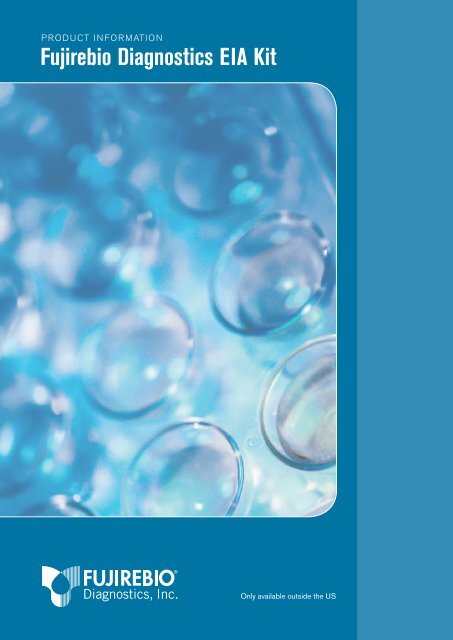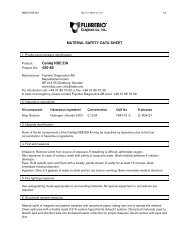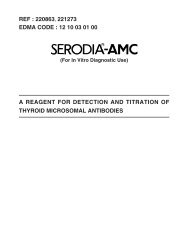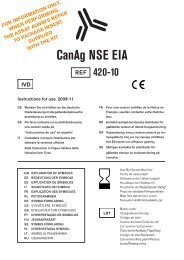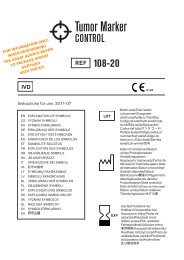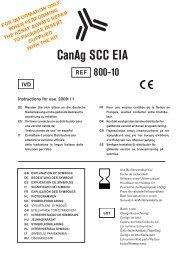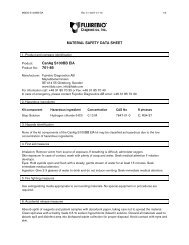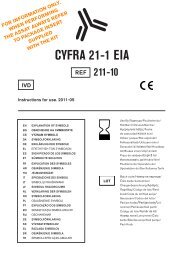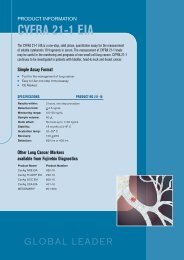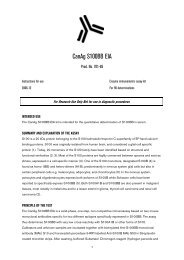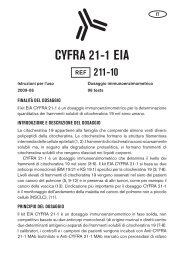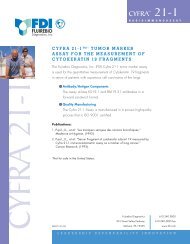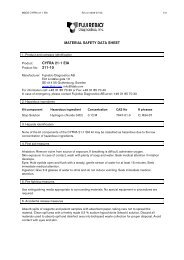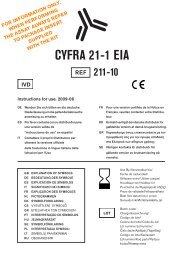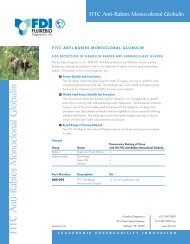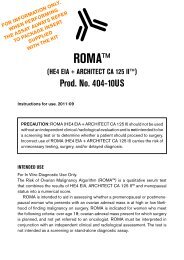Download the Fujirebio Diagnostics EIA Kit Catalogue
Download the Fujirebio Diagnostics EIA Kit Catalogue
Download the Fujirebio Diagnostics EIA Kit Catalogue
You also want an ePaper? Increase the reach of your titles
YUMPU automatically turns print PDFs into web optimized ePapers that Google loves.
PRODUCT I N FOR MATION<br />
<strong>Fujirebio</strong> <strong>Diagnostics</strong> <strong>EIA</strong> <strong>Kit</strong><br />
Only available outside <strong>the</strong> US
Working Toge<strong>the</strong>r for Better <strong>Diagnostics</strong><br />
Introduction<br />
Features and Benefits of <strong>EIA</strong><br />
kits from <strong>Fujirebio</strong> <strong>Diagnostics</strong><br />
Simple and robust protocols<br />
Ready to Use reagents<br />
Simple one and two-step<br />
sandwich assays<br />
Streptavidin coated microplates<br />
Proprietary, characterized, high<br />
affinity monoclonal antibodies<br />
Low sample volume<br />
<strong>Fujirebio</strong> <strong>Diagnostics</strong> is a world leader in in vitro diagnostics and <strong>the</strong><br />
gold standard manufacturer of cancer biomarker assays worldwide.<br />
We have extensive expertise in <strong>the</strong> development, manufacturing,<br />
and commercialization of in vitro diagnostic products for a<br />
variety of disease states. <strong>Fujirebio</strong> <strong>Diagnostics</strong>´ range of antibodies<br />
against tumor antigens are <strong>the</strong> core of our assay kits, available in<br />
both manual assay formats (RIA and <strong>EIA</strong>) and as custom developed<br />
products for use through our partners’ systems worldwide.<br />
In 2006, CanAg <strong>Diagnostics</strong> merged with <strong>Fujirebio</strong> <strong>Diagnostics</strong>, Inc.<br />
to form <strong>the</strong> largest manufacturer of oncology biomarkers in <strong>the</strong><br />
industry. <strong>Fujirebio</strong> <strong>Diagnostics</strong> have maintained <strong>the</strong> CanAg brand<br />
name for those <strong>EIA</strong> kits that CanAg customers around <strong>the</strong> world have<br />
come to associate with superior quality and reliability.<br />
<strong>Fujirebio</strong> <strong>Diagnostics</strong> is a fully owned subsidiary of <strong>Fujirebio</strong> Inc.,<br />
Tokyo, Japan. <strong>Fujirebio</strong> Inc. was established in 1950 and its ultimate<br />
goal is to contribute to medical treatment and human welfare worldwide<br />
as a Global life science company. <strong>Fujirebio</strong>, Inc. has been a pioneer in<br />
<strong>the</strong> field of clinical diagnostics with a focus on cancer markers, infectious<br />
disease, hormone and thyroid testing.<br />
Quality<br />
<strong>Fujirebio</strong> <strong>Diagnostics</strong> is committed to providing quality products that<br />
meet <strong>the</strong> requirements of our customers. Our quality management<br />
system encompasses every aspect of product realization, from design<br />
through manufacturing and product shipment to allow us to achieve <strong>the</strong><br />
high standards required by regulatory authorities and our customers.<br />
All in vitro diagnostic products are CE marked. The CE-mark indicates<br />
that <strong>the</strong> product complies with <strong>the</strong> requirements of <strong>the</strong> European In<br />
Vitro <strong>Diagnostics</strong> Directive 98/79/EC. All <strong>Fujirebio</strong> <strong>Diagnostics</strong>´ kits<br />
are manufactured in one of our ISO13485 certified facilities located<br />
in Go<strong>the</strong>nburg, Sweden or Malvern, PA, USA.
CONTENT<br />
Working for better diagnostics 2<br />
<strong>Diagnostics</strong> for cancer and brain damage 4<br />
GYNECOLOGICAL CANCER<br />
CanAg CA125 <strong>EIA</strong> 5<br />
HE4 <strong>EIA</strong> 5<br />
CanAg SCC <strong>EIA</strong> 6<br />
LUNG CANCER<br />
CanAg NSE <strong>EIA</strong> 6<br />
CYFRA 21-1 <strong>EIA</strong> 7<br />
CanAg ProGRP <strong>EIA</strong> 7<br />
MESOMARK ® <strong>EIA</strong> 10<br />
Marker Significance 8<br />
Product Specifications 9<br />
GASTROINTESTINAL CANCER<br />
CanAg CA242 <strong>EIA</strong> 10<br />
CanAg CEA <strong>EIA</strong> 11<br />
CanAg CA19-9 <strong>EIA</strong> 11<br />
PROSTATE CANCER<br />
CanAg PSA <strong>EIA</strong> 12<br />
CanAg Free PSA <strong>EIA</strong> 12<br />
BREAST CANCER<br />
CanAg CA15-3 <strong>EIA</strong> 13<br />
OTHER<br />
Liver Cancer – CanAg AFP <strong>EIA</strong> 13<br />
Malignant Melanoma – CanAg S100 <strong>EIA</strong> 14<br />
Tumor Marker Control – CanChek 15
<strong>Diagnostics</strong> for Cancer and Brain Damage<br />
Cancer is one of <strong>the</strong> major causes of death in <strong>the</strong> western world second only<br />
to cardiovascular disease. Every third person will develop cancer and every<br />
fourth person will ultimately die from cancer. For improved outcomes and<br />
survival rates it is essential to detect cancer early.<br />
Biochemical substances are released from cells and can be used as markers<br />
of disease in patient blood samples. These biomarkers may be used<br />
in cancer diagnosis/management (tumor markers) or as markers of brain<br />
damage (Biochemical Markers of Brain Damage, BMBD).<br />
Serological tumor and brain damage marker determinations represent<br />
an important patient management tool in, among o<strong>the</strong>rs, <strong>the</strong> following<br />
applications:<br />
Technician working with<br />
<strong>the</strong> establishment of<br />
new hybridomas in our<br />
laboratory in Sweden.<br />
Identification of disease at an early stage in combination with o<strong>the</strong>r<br />
diagnostic tools<br />
Generation of prognostic information<br />
Follow up of <strong>the</strong> effectiveness of treatment<br />
Monitoring <strong>the</strong> course of disease<br />
Early detection of recurrent disease<br />
Laboratory Tests<br />
Our tests make it possible to detect and/or monitor all of <strong>the</strong> most common<br />
forms of solid tumors, such as gastrointestinal, squamous cell, liver,<br />
pancreatic, prostate, ovarian, breast, skin and lung cancer. The company<br />
has also developed markers for brain damage after e.g. acute brain trauma,<br />
stroke, and hypoxia.<br />
Our kits can be used on a wide range of microplate instruments giving<br />
considerable flexibility and cost efficiency for hospitals and laboratories.<br />
The kits are available globally through our Distributor Network.<br />
4
Gynecological Cancer<br />
CanAg CA125 <strong>EIA</strong> 400-10<br />
Determination of <strong>the</strong> CA125 antigen is of clinical utility in ovarian cancer. It can<br />
be used for:<br />
1. Differential diagnosis between ovarian tumors and benign disease.<br />
2. Monitoring disease progression and regression.<br />
3. Prognosis of survival time.<br />
4. Early detection of recurrence.<br />
SPECIFICATIONS<br />
Results within: 4 hours<br />
Detection limit: < 1.5 U/mL<br />
Measuring range: 1.5-500 U/mL<br />
(may be extended by sample dilution)<br />
Sample volume: 25 µL<br />
Hook effect: No hook up to 50 000 U/mL<br />
Stability: 18 months at 2-8° C<br />
Incubation temp: 20-25° C<br />
Detection: 620 nm or 405 nm<br />
ORDERING INFORMATION<br />
Prod. No. 400-10<br />
CanAg CA125 <strong>EIA</strong><br />
For 96 determinations<br />
HE4 <strong>EIA</strong> 404-10<br />
The HE4 <strong>EIA</strong> is an enzyme immunometric assay for <strong>the</strong> quantitative determination<br />
of HE4 in human serum. The HE4 <strong>EIA</strong> is intended to be used as<br />
an aid in monitoring response to <strong>the</strong>rapy for patients with invasive epi<strong>the</strong>lial<br />
ovarian cancer. It is fur<strong>the</strong>r intended to be used with <strong>the</strong> CanAg CA125 and<br />
ARCHITECT CA 125 II assay for in vitro diagnostic use as an aid in estimating<br />
<strong>the</strong> risk of epi<strong>the</strong>lial ovarian cancer in premenopausal and postmenopausal<br />
women presenting with pelvic mass.<br />
Numerous published studies show that a woman’s outcome is better<br />
when her ovarian cancer surgery is performed by a gynecologic oncologist.<br />
An estimation of <strong>the</strong> risk of ovarian cancer in a patient presenting with a pelvic<br />
mass may <strong>the</strong>refore be a helpful tool in determining who should be referred<br />
to a gynecologic oncologist for her surgery.<br />
SPECIFICATIONS<br />
Results within: 3 hours<br />
Detection limit: < 15 pM<br />
Measuring range: 15-900 pM<br />
(may be extended by sample dilution)<br />
Sample volume: 25 µL<br />
Hook effect: No hook up to 300 000 pM<br />
Stability: 18 months at 2-8° C<br />
Incubation temp: 20-25° C<br />
Detection: 620 nm or 405 nm<br />
ORDERING INFORMATION<br />
Prod. No. 404-10<br />
HE4 <strong>EIA</strong><br />
For 96 determinations<br />
5
Gynecological Cancer / Lung Cancer<br />
800-10<br />
CanAg SCC <strong>EIA</strong><br />
Squamous cell carcinoma antigen (SCCA) is a serological marker for<br />
squamous cell carcinomas (SCC) of <strong>the</strong> uterine cervix, lung, head and neck,<br />
vulva, and esophagus. Serum concentrations of SCCA in patients with SCC<br />
are correlated to <strong>the</strong> clinical stage, tumor volume and to <strong>the</strong> degree of<br />
histological differentiation of <strong>the</strong> tumor.<br />
SPECIFICATIONS<br />
Results within: 2 hours, one step procedure<br />
Detection limit: < 0.3 µg/L<br />
Measuring range: < 0.3-50 µg/L<br />
(may be extended by sample dilution)<br />
Sample volume: 25 µL<br />
Hook effect: No hook up to 50 000 µg/L<br />
Stability: 18 months at 2-8° C<br />
Incubation temp: 20-25° C<br />
Detection: 620 nm or 405 nm<br />
ORDERING INFORMATION<br />
Prod. No. 800-10<br />
CanAg SCC <strong>EIA</strong><br />
For 96 determinations<br />
420-10 CanAg NSE <strong>EIA</strong><br />
Determination of NSE antigen is of clinical utility in small cell lung cancer.<br />
It can be used for:<br />
1. Differential diagnosis between Non Small Cell Lung Cancer (NSCLC)<br />
and Small Cell Lung Cancer (SCLC).<br />
2. Monitoring disease progression and regression in patients with SCLC.<br />
3. Early detection of recurrent disease.<br />
4. Prognosis of survival time.<br />
SPECIFICATIONS<br />
Results within: 2 hours, one step procedure<br />
Detection limit: < 1 µg/L<br />
Measuring range: 1-150 µg/L<br />
(may be extended by sample dilution)<br />
Sample volume: 25 µL<br />
Hook effect: No hook up to 200 000 µg/L<br />
Stability: 18 months at 2-8° C<br />
Incubation temp: 20-25° C<br />
Detection: 620 nm or 405 nm<br />
ORDERING INFORMATION<br />
Prod. No. 420-10<br />
CanAg NSE <strong>EIA</strong><br />
For 96 determinations<br />
6
Lung Cancer<br />
CYFRA 21-1 <strong>EIA</strong><br />
211-10<br />
The CYFRA 21-1 <strong>EIA</strong> is a one-step, solid phase, quantitative assay for <strong>the</strong> measurement<br />
of soluble cytokeratin 19 fragments in serum. The measurement of<br />
CYFRA 21-1 levels may be useful in <strong>the</strong> monitoring and prognosis of non-small<br />
cell lung cancer. Elevated levels of cytokeratin 19 fragments are seen in serum<br />
from patients also in several o<strong>the</strong>r cancers such as esophagus, head-& neck and<br />
breast cancer.<br />
SPECIFICATIONS<br />
Results within: 2 hours, one step procedure<br />
Detection limit: < 0.5 ng/mL<br />
Measuring range: 0.5-50 ng/mL<br />
(may be extended by sample dilution)<br />
Sample volume: 50 µL<br />
Hook effect: No hook up to 11 000 ng/mL<br />
Stability: 18 months at 2-8° C<br />
Incubation temp: 20-25° C<br />
Detection: 620 nm or 405 nm<br />
ORDERING INFORMATION<br />
Prod. No. 211-10<br />
CanAg CYFRA 21-1 <strong>EIA</strong><br />
For 96 determinations<br />
CanAg ProGRP <strong>EIA</strong>* (For Research Use Only)<br />
220-85<br />
ProGRP is <strong>the</strong> precursor of <strong>the</strong> gut hormone GRP (Gastrin Releasing Peptide).<br />
ProGRP is stable in serum and has been shown to be elevated in patients<br />
diagnosed with Small Cell Lung Cancer (SCLC). The assay is a one-step<br />
immunoassay that utilizes biotinylated Anti-ProGRP polyclonal antibody and<br />
horseradish peroxidase (HRP) labeled Anti-ProGRP Monoclonal Antibody<br />
E146 in Streptavidin coated microtiter strips for <strong>the</strong> measurement of ProGRP<br />
in serum.<br />
SPECIFICATIONS<br />
Results within: 3 hours, one step procedure<br />
Detection limit: 2 ng/L<br />
Measuring range: 2-1000 ng/L<br />
(may be extended by sample dilution)<br />
Sample volume: 50 µL<br />
Stability: 18 months at 2-8° C<br />
Calibrator range: 0-1000 ng/L<br />
Incubation temp: 20-25° C<br />
Detection: 450 nm<br />
ORDERING INFORMATION<br />
Prod. No. 220-85<br />
CanAg ProGRP <strong>EIA</strong><br />
For 96 determinations<br />
* After receving CE-mark <strong>the</strong> product number will be 220-10.<br />
7
Marker Significance<br />
CANCER<br />
(localization)<br />
CA242<br />
CA19-9<br />
SCC<br />
CA125<br />
HE4<br />
CA15-3<br />
NSE<br />
CEA<br />
CYFRA 21-1<br />
ProGRP<br />
MESOMARK<br />
PSA<br />
Free PSA<br />
AFP<br />
S100<br />
GASTROINTESTINAL<br />
Colorectal<br />
Pancreatic<br />
Esophagus<br />
GYNECOLOGICAL<br />
Ovarian<br />
Cervical<br />
Endometrial<br />
LUNG<br />
NSCLC<br />
SCLC<br />
Malignant Meso<strong>the</strong>lioma<br />
Prostate<br />
Breast<br />
Liver<br />
Germ Cell / Testicular<br />
Thyroid<br />
Head & Neck<br />
Melanoma<br />
MARKER SIGNIFICANCE less more
Product Specifications<br />
MARKER<br />
CATALOG SAMPLE RESULTS DETECTION MEASURING SAMPLE HIGH DOSE NORMAL WITHIN- BETWEEN<br />
NUMBER WITHIN LIMIT RANGE VOLUME HOOK RANGE RUN CV (%) DAY CV (%)<br />
CA242 101-10 Serum 4 hours < 1 1 - 150 25 µL > 150 000 < 25 3.8 - 4.7 2.2 - 3.8<br />
two-step U/mL U/mL U/mL U/mL<br />
CA19-9 120-10 Serum 4 hours < 1 1 - 240 25 µL > 50 000 < 37 3.3 - 4.5 6.2 - 7.0<br />
two-step U/mL U/mL U/mL U/mL<br />
SCC 800-10 Serum 2 hours < 0.3 0.3 - 50 25 µL > 50 000 < 1.5 1.9 - 2.4 1.1 - 1.9<br />
one-step µg/L µg/L µg/L µg/L<br />
CA125 400-10 Serum 4 hours < 1.5 1.5 - 500 25 µL > 50 000 < 35 2.9 - 4.4 3.1 - 4.0<br />
two-step U/mL U/mL U/mL U/mL<br />
HE4 404-10 Serum 3 hours < 15 15 - 900 25 µL > 300 000 < 150 1.4 - 3.7 2.5 - 4.7<br />
two-step pM pM pM pM<br />
CA15-3 200-10 Serum 3 hours < 1 1 - 250 25 µL > 7 500 < 30 3.0 - 3.7 5.6 - 11<br />
one-step U/mL U/mL U/mL U/mL<br />
NSE 420-10 Serum 2 hours < 1 1 - 150 25 µL 200 000 < 13 1.7 - 3.5 3.7 - 5.5<br />
one-step µg/L µg/L µg/L µg/L<br />
CEA 401-10 Serum 2 hours < 0.25 0.25 - 75 25 µL > 250 000 < 5 1.9 - 2.8 1.5 - 2.7<br />
one-step µg/L µg/L µg/L µg/L<br />
CYFRA 21-1 211-10 Serum 2 hours < 0.5 0.5-50 50 µL > 1100 < 1.6 1.7 - 2.7 3.0 - 3.9<br />
one-step ng/mL ng/mL ng/mL ng/mL<br />
ProGRP 220-85 Serum 3 hours < 4 4 - 2 000 50 µL > 800 000 — 1.3 - 6.9 0.8 - 4.4<br />
one-step ng/L ng/L ng/L<br />
MESOMARK 801-900 Serum 3 hours < 0.3 0.3 - 320 10 µL > 10 291 < 1.5 1.1 - 5.3 —<br />
nM nM nM nM<br />
PSA Total 340-10 Serum 2 hours < 0.1 0.1 - 60 25 µL > 23 000 < 4 1.5 - 2.7 0.8 - 2.2<br />
one-step µg/L µg/L µg/L µg/L<br />
Free PSA 350-10 Serum 2 hours < 0.03 0.03 - 10 50 µL > 5 000 n/a 1.3 - 1.9 1.8 - 3.0<br />
one-step µg/L µg/L µg/L<br />
AFP 600-10 Serum 2 hours < 0.5 0.5 - 500 25 µL > 40 000 < 10 1.6 - 2.0 1.4 - 2.0<br />
one-step µg/L µg/L µg/L µg/L<br />
S100 708-10 Serum 4 hours < 0.01 0.01 - 3.5 50 µL > 150 < 0.1 1.3 - 2.5 1.5 - 2.5<br />
two-step µg/L µg/L µg/L µg/L
Lung Cancer / Gastrointestinal Cancer<br />
801-900<br />
MESOMARK ® <strong>EIA</strong><br />
MESOMARK <strong>EIA</strong> is an enzyme linked immunosorbent assay for <strong>the</strong> quantitative<br />
measurement of soluble meso<strong>the</strong>lin related peptide (SMRP). The assay<br />
is a standard sandwich assay that utilizes two monoclonal antibodies, 4H3<br />
and OV569, in <strong>the</strong> capture and detection of SMRP. SMRP has been shown<br />
to be elevated in patients diagnosed with malignant meso<strong>the</strong>lioma, an asbestos<br />
related cancer of <strong>the</strong> pleural lining of <strong>the</strong> lungs, heart, and abdomen.<br />
SPECIFICATIONS<br />
Results within: 3 hours<br />
Detection limit: < 0.3 nM<br />
Measuring range: 0.3-320 nM<br />
Sample volume: 10 µL<br />
Hook effect: No hook up to 10 291 nM<br />
Stability: 12 months at 2-8° C<br />
Calibrator range: 0-32 nM<br />
Incubation temp: 20-25° C<br />
Detection: 450 nm<br />
ORDERING INFORMATION<br />
Prod. No. 801-900<br />
MESOMARK <strong>EIA</strong><br />
For 96 determinations<br />
101-10<br />
CanAg CA242 <strong>EIA</strong><br />
CA242 is <strong>the</strong> latest generation marker of colorectal and pancreatic cancer.<br />
The high specificity of CA242 is useful for differentiating between pancreatic<br />
cancer and benign hepatobiliary disease. CA242 also gives prognostic<br />
information in pancreatic as well as in colorectal cancer. The combined<br />
use of CA242 with CEA (Carcino Embryonic Antigen) shows improved sensitivity<br />
both pre- and post-operatively.<br />
SPECIFICATIONS<br />
Results within: 4 hours<br />
Detection limit: < 1 U/mL<br />
Measuring range: 1-150 U/mL<br />
(may be extended by sample dilution)<br />
Sample volume: 25 µL<br />
Hook effect: No hook up to 150 000 U/mL<br />
Stability: 18 months at 2-8° C<br />
Incubation temp: 20-25° C<br />
Detection: 620 nm or 405 nm<br />
ORDERING INFORMATION<br />
Prod. No. 101-10<br />
CanAg CA242 <strong>EIA</strong><br />
For 96 determinations<br />
10
Gastrointestinal Cancer<br />
CanAg CEA <strong>EIA</strong> 401-10<br />
Carcinoembryonic antigen (CEA) is a general tumor marker, which shows<br />
clinical utility in gastrointestinal cancer as well as breast and lung cancer.<br />
The CanAg CEA <strong>EIA</strong> is a solid-phase non-competitive assay based on <strong>the</strong><br />
direct sandwich technique. The antibodies used target <strong>the</strong> Gold epitope 4 and 5<br />
for optimal clinical sensitivity and specificity and non-specific interference.<br />
SPECIFICATIONS<br />
Results within: 2 hours, one step procedure<br />
Detection limit: < 0.25 µg/L<br />
Measuring range: 0.25-75 µg/L<br />
(may be extended by sample dilution)<br />
Sample volume: 25 µL<br />
Hook effect: No hook up to 250 000 µg/L<br />
Stability: 18 months at 2-8° C<br />
Incubation temp: 20-25° C<br />
Detection: 620 nm or 405 nm<br />
ORDERING INFORMATION<br />
Prod. No. 401-10<br />
CanAg CEA <strong>EIA</strong><br />
For 96 determinations<br />
CanAg CA19-9 <strong>EIA</strong> 120-10<br />
CA19‐9 is a well established marker for differentiation between malignant<br />
and benign pancreas disease, to follow up patients undergoing treatment<br />
and to detect recurrence. The incidence of pancreatic cancer continues to<br />
increase in <strong>the</strong> industrialized world. One way to improve <strong>the</strong> poor prognosis<br />
of pancreatic cancer is early detection of <strong>the</strong> tumor combined with a possibly<br />
curative resection.<br />
SPECIFICATIONS<br />
Results within: 4 hours<br />
Detection limit: < 1 U/mL<br />
Measuring range: 1-240 U/mL<br />
(may be extended by sample dilution)<br />
Sample volume: 25 µL<br />
Hook effect: No hook up to 50 000 U/mL<br />
Stability: 18 months at 2-8° C<br />
Incubation temp: 20-25° C<br />
Detection: 620 nm or 405 nm<br />
ORDERING INFORMATION<br />
Prod. No. 120-10<br />
CanAg CA19-9 <strong>EIA</strong><br />
For 96 determinations<br />
11
Prostate Cancer<br />
340-10<br />
CanAg PSA <strong>EIA</strong><br />
Increasing serum concentrations of PSA (Prostate Specific Antigen) may<br />
indicate cancer of <strong>the</strong> prostate. In patient serum PSA exists in its free form<br />
(Free PSA) and in stable complexes with different protease inhibitors. The<br />
most important complex is formed with α1-antichymo-trypsin (PSA-ACT).<br />
The CanAg PSA <strong>EIA</strong> determines <strong>the</strong> total amount of PSA, with <strong>the</strong> same<br />
molar response for free and complexed PSA.<br />
SPECIFICATIONS<br />
Results within: 2 hours, one step procedure<br />
Detection limit: < 0.1 µg/L<br />
Measuring range: 0.1-60 µg/L<br />
(may be extended by sample dilution)<br />
Sample volume: 25 µL<br />
Hook effect: No hook up to 23 000 µg/L<br />
Stability: 18 months at 2-8° C<br />
Incubation temp: 20-25° C<br />
Detection: 620 nm or 405 nm<br />
ORDERING INFORMATION<br />
Prod. No. 340-10<br />
CanAg PSA <strong>EIA</strong><br />
For 96 determinations<br />
350-10<br />
CanAg Free PSA <strong>EIA</strong><br />
It has been shown that <strong>the</strong> proportion of free PSA to total PSA in serum is<br />
often lower in men with prostate cancer than in men with benign prostatic<br />
hyperplasia. Determination of free PSA may <strong>the</strong>refore be used in conjunction<br />
with total PSA as an aid in <strong>the</strong> differentiation between benign prostatic<br />
hyperplasia and prostate cancer.<br />
SPECIFICATIONS<br />
Results within: 2 hours, one step procedure<br />
Detection limit: < 0.03 µg/L<br />
Measuring range: 0.03-10 µg/L<br />
(may be extended by sample dilution)<br />
Sample volume: 50 µL<br />
Hook effect: No hook up to 5 000 µg/L<br />
Stability: 18 months at 2-8° C<br />
Incubation temp: 20-25° C<br />
Detection: 450 nm<br />
ORDERING INFORMATION<br />
Prod. No. 350-10<br />
CanAg Free PSA <strong>EIA</strong><br />
For 96 determinations<br />
12
Breast Cancer / Liver Cancer<br />
CanAg CA15-3 <strong>EIA</strong> 200-10<br />
Breast cancer is <strong>the</strong> third most frequent form of cancer with a mortality rate<br />
of approximately 20 per 100,000 women. CA15‐3 is primarily used in <strong>the</strong><br />
management of breast cancer patients, for monitoring <strong>the</strong> disease, to follow up<br />
<strong>the</strong> effect of treatment as well as for early detection of recurrence. There is<br />
also a positive correlation between low preoperative serum levels of CA15‐3<br />
and good prognosis.<br />
SPECIFICATIONS<br />
Results within: 3 hours, one step procedure<br />
Detection limit: < 1 U/mL<br />
Measuring range: 1-250 U/mL<br />
(may be extended by sample dilution)<br />
Sample volume: 25 µL (diluted samples 1:41)<br />
Hook effect: No hook up to 7 500 U/mL<br />
Stability: 12 months at 2-8° C<br />
Incubation temp: 20-25° C<br />
Detection: 620 nm or 405 nm<br />
ORDERING INFORMATION<br />
Prod. No. 200-10<br />
CanAg CA15-3 <strong>EIA</strong><br />
For 96 determinations<br />
CanAg AFP <strong>EIA</strong> 600-10<br />
AFP is present in low concentrations in serum, but may be markedly increased<br />
in patients with cancer of <strong>the</strong> liver, testis or ovary. The CanAg AFP<br />
<strong>EIA</strong> is a solid-phase non-competitive assay based on <strong>the</strong> direct sandwich<br />
technique using <strong>the</strong> AFPK51 MAb and AFPK57 MAb for optimal clinical sensitivity,<br />
specificity and non-specific interference. The antigenic determinants<br />
of AFP have been characterised in an International Workshop under <strong>the</strong> auspices<br />
of ISOBM (ISOBM TD-2 Workshop).<br />
SPECIFICATIONS<br />
Results within: 2 hours, one step procedure<br />
Detection limit: < 0.5 µg/L<br />
Measuring range: 0.5-500 µg/L<br />
(may be extended by sample dilution)<br />
Sample volume: 25 µL<br />
Hook effect: No hook up to 40 000 µg/L<br />
Stability: 18 months at 2-8° C<br />
Incubation temp: 20-25° C<br />
Detection: 620 nm or 405 nm<br />
ORDERING INFORMATION<br />
Prod. No. 600-10<br />
CanAg AFP <strong>EIA</strong><br />
For 96 determinations<br />
13
Malignant Melanoma<br />
S100B is a 20 kDa protein belonging to <strong>the</strong> S100/calmodulin/troponin C super family of EF-hand calcium<br />
binding proteins. S100 was originally isolated in 1965 from human brain and was considered as a brain<br />
specific protein. Today more than 20 members of <strong>the</strong> S100 family have been characterised based on structural<br />
and functional similarities.<br />
In brain tissue, S100B is found as hetero- and homodimers of A1 (α)- and B (ß)-subunits. The A1-<br />
and B-subunits show a high degree of sequence and species homology.<br />
In <strong>the</strong> nervous system S100A1B and S100BB dimers exist in high concentration in astrocytes,<br />
oligodendrocytes and Schwann cells.<br />
S100A1B and S100BB are also expressed in a limited proportion of cells outside <strong>the</strong> nervous<br />
system eg. melanocytes, adipocytes and chondrocytes as well as in certain malignant cells,<br />
most notably in melanoma.<br />
Serum S100B is a sensitive biomarker for Malignant Melanoma. It is also clinically proven to be useful<br />
for management of patients with brain damage.<br />
708-10<br />
CanAg S100 <strong>EIA</strong><br />
The CanAg S100 <strong>EIA</strong> is a solid-phase, non-competitive direct sandwich<br />
assay. The assay is based on two monoclonal antibodies, S23 MAb and S53<br />
MAb, targeting two regions of S100B exposed in both <strong>the</strong> S100A1B- and<br />
S100BB dimer. This antibody combination provides an assay with similar<br />
sensitivity for <strong>the</strong>se two forms of S100B.<br />
SPECIFICATIONS<br />
Results within: 4 hours<br />
Detection limit: < 0.01 µg/L<br />
Measuring range: 0.01-3.5 µg/L<br />
Sample volume: 50 µL<br />
Hook effect: No hook up to 150 µg/L<br />
Stability: 18 months at 4° C<br />
Incubation temp: 20-25° C<br />
Detection: 620 nm or 405 nm<br />
ORDERING INFORMATION<br />
Prod. No. 708-10<br />
CanAg S100 <strong>EIA</strong><br />
For 96 determinations<br />
14
Tumor Marker Control<br />
CanChek (Tumor Marker Control)<br />
The CanChek tumor marker control is for use as a quality control serum to<br />
monitor laboratory testing of Neuron Specific Enolase (NSE), S100B protein<br />
and Squamous Cell Carcinoma antigen (SCC). Two levels of <strong>the</strong> control are<br />
provided to enable performance monitoring over <strong>the</strong> clinical range.<br />
107-20<br />
SPECIFICATIONS<br />
Control: 3 vials of level 1<br />
3 vials of level 2<br />
Volume: 6 x 0.75 mL<br />
Stability: 24 months<br />
ORDERING INFORMATION<br />
Prod. No. 107-20<br />
CanChek Control<br />
For 96 determinations<br />
15
Oncology<br />
101‐10 CanAg CA242 <strong>EIA</strong><br />
Pancreatic & Gastrointestinal Cancer<br />
120‐10 CanAg CA19‐9 ElA<br />
Pancreatic Cancer<br />
200‐10 CanAg CA15‐3 ElA<br />
Breast Cancer<br />
211‐10 CYFRA 21-1 <strong>EIA</strong><br />
Lung Cancer<br />
220-85 CanAg ProGRP <strong>EIA</strong><br />
Lung Cancer<br />
340‐10 CanAg PSA ElA<br />
Prostate Cancer<br />
350‐10 CanAg Free PSA <strong>EIA</strong><br />
Prostate Cancer<br />
400‐10 CanAg CA125 <strong>EIA</strong><br />
Ovarian Cancer<br />
401-10 CanAg CEA <strong>EIA</strong><br />
Gastrointestinal, Breast & Lung Cancer<br />
404-10 HE4 <strong>EIA</strong><br />
Ovarian Cancer<br />
420‐10 CanAg NSE <strong>EIA</strong><br />
Lung Cancer<br />
600‐10 CanAg AFP <strong>EIA</strong><br />
Liver Cancer<br />
708-10 CanAg S100 <strong>EIA</strong><br />
Malignant Melanoma<br />
800‐10 CanAg SCC <strong>EIA</strong><br />
Squamous Cell Carcinoma<br />
801‐900 MESOMARK ® <strong>EIA</strong><br />
Malignant Meso<strong>the</strong>lioma<br />
107‐20 CanChek<br />
Tumor Marker Control<br />
<strong>Fujirebio</strong> <strong>Diagnostics</strong> Inc.<br />
201 Great Valley Parkway<br />
Malvern, PA 19355-1307<br />
USA<br />
+1 610 240 3800 phone<br />
+1 610 240 3949 fax<br />
info@fdi.com e-mail<br />
www.fdi.com website<br />
<strong>Fujirebio</strong> <strong>Diagnostics</strong> AB<br />
Elof Lindälvsgata 13<br />
PO Box 121 32<br />
SE-402 42 Göteborg<br />
Sweden<br />
+46 31 85 70 30 phone<br />
+46 31 85 70 40 fax<br />
info@fdab.com e-mail<br />
www.fdab.com website<br />
Brain Damage<br />
708-10 CanAg S100 <strong>EIA</strong><br />
<strong>EIA</strong> <strong>Kit</strong> <strong>Catalogue</strong>, October 2009<br />
CanAg ® is a registered trademark of <strong>Fujirebio</strong> <strong>Diagnostics</strong> AB


